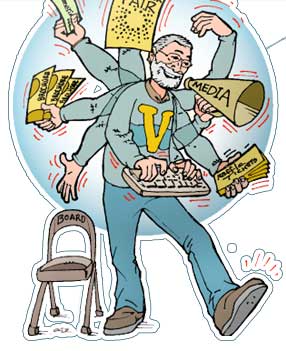








Which Cookie Would You Choose?
Brandon
Sun “Small World” Column, Monday, January 24 / 22
Zack Gross
Zack Gross
Over the holiday season, many of us tend to over-eat! Stepping on the weigh scale in early January is likely to reveal, as it did in our household, a five pound (about 2.3 kg) gain. That’s why weight loss and exercise programs and equipment dealers advertise so aggressively in the New Year.
Which brings us around to the topic of cookies. And, believe it or not, world poverty, climate change and ethics. And “community”. Somehow, in chatting about our dining room table being covered over the holidays with melting moment cookies (my wife’s specialty), fruit cake from her brother, biscotti and brownies from her sister, liquor filled chocolates (my favourite) and more, we ended up in a discussion of how you choose your treat.
In observing our children and other relations, we noticed that some people go for the overloaded plate (followed by seconds) at meals, sometimes without regard to whether there is enough for all. Is this a sign of greed, or just greater appetites, or blindness to the needs of others? Maybe it’s just that you’ve served someone’s favourite food and they are enthusiastic beyond caring.
Cookies. My wife said that in her family when she was a kid, you were taught to take the cookie that was right in front of you. That is, not the largest, and not the one with the most chocolate chips, but the one closest to you. That was being polite.
When I was young, I was struck by the story of Elijah the Prophet. In our Jewish household, at large family gathering meals, it was standard to leave a seat open at the table with plate, cutlery, etc. “for Elijah”, or as we were taught, for the cold, hungry stranger who might come in need to the door.
Ultimately, that kind of thinking stuck with me and I ended up in a long career in poverty alleviation. It also meant that when I line up at dinner to eat, I take a small portion. And my wife’s thinking is to be polite and accept what you are given with gratitude. This might make us sound rather self-righteous and really no fun at all! It might also make us sound like what our image of “Canadian” is all about – we are polite, we are understated, we help our neighbour, we are supportive of diversity, and we welcome the newcomer.
There are numerous stories from the holiday season and beyond about how people have pitched in to help. One that sticks with me is that when that massive snowstorm recently shut down Toronto with up to 50 cm of snow, with vehicles stranded for hours on the highways, semi drivers got out of their rigs and often used just their hands and arms to scoop up snow in order to get folks out of ditches and moving again.
Here in Manitoba, generous donations in cash and kind have helped to make meals and toys available to families through community non-profits. I’m aware of a business that donated dozens of children’s bicycles and another that put a turkey in every local hamper.
At the same time, our world is one of armed tensions in eastern Europe, growing intolerance and political polarization in many countries, seismic and climate disasters around the globe, and more. How does the cookie analogy connect to these “macro” issues?
There are philosophical movements in the world today that focus on “the good life” and “enough”. Is the good life something we strive for and never reach throughout our lives, as we accumulate and consume more and more, to the detriment of those around us and the environment? That would be the person who lines up to eat at our dinner, fills their plate, and then eats while rejoining the line in order to get more. Who in the world would that be? When is enough, enough?
Then, there are those who don’t get to eat enough to satisfy nutritional requirements, affecting their ability to learn and earn a living. I heard today on the radio that Canada ranks 37th out of 41 countries when it comes to offering children a nutritious diet. Some of that might be the availability of junk food, but a lot of it is poverty-related.
When we choose the biggest cookies, we may not only be short-changing those around us, but we may also be dooming our world to more years of weather events, wars, disease and political instability. Those “biggest cookies” might be the way we transport ourselves, heat and cool our homes, govern ourselves, run our businesses and treat those around us, near and far.
Which cookie would you choose?
Zack Gross is Board Chair of The Marquis Project, a Brandon-based international development organization, and co-author of the new book The Fair Trade Handbook: Building a Better World, Together.
* * * * *
Return to Articles page
Return to Articles page